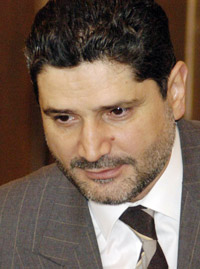Yesterday the president of the RA Central Bank (CB) Tigran Sargsyan presented the monetary policy of 2006, which is yet to be presented to the National Assembly. The CB anticipates 10 % of economical growth and 3 % of inflation this year. According to statistical data, last year the inflation mark made up 0,6 %.
This year the CB has adopted a policy of providing the adequate inflation level; this means that the CB will not have to explain why the money capacity is changed any more. The main leverage to keep inflation from growing is the interest rate, i.e. the price of money, by increasing it the CB makes the demand for it go down. In other words if there is not much money, the prices will not grow. So what if the price for gas increases up to 110 dollars for 1000 c.m.? Tigran Sargsyan thinks that “the gas issue is easier to deal with than the bread issue”, because gas is not used so much in the consumer basket. Besides that, gas influences on the prices of other goods indirectly and takes some time, during which the CB will be able to keep inflation from growing. Anyway Tigran Sargsyan said that if gas price is increased the CB will make new evaluations for inflation.
What does the CB do to make banks bigger? There are two strategies. The first one is the normative changes, which the CB has been doing for the past ten years. “By increasing the capacity of the needed minimum bank capital rapidly we made them get bigger”, says Tigran Sargsyan. The second strategy is the creation of a string competition environment and the main premise is the adoption of corporative management principles. Tigran Sargsyan assured that as a result of this, either banks will join or will get bigger. As a matter of fact, there are already ten banks in Armenia for which the main capital covers more then 10 million dollars, when according to the relevant normative, the minimum limit of the capital is five million dollars.
According to Tigran Sargsyan in order to make it easier for people and banks to control the activities of the CB, he has suggested the banks to let them publish information about how, when and how many penalties they have imposed on banks. But the banks have rejected this offer.
The CB doesn’t anticipate any political risks in the monetary policy. Anyway Tigran Sargsyan thinks that the international institutions will not register any changes regarding this in 2006.
P.S. Every time Tigran Sargsyan doesn’t hesitate to note that the CB, as the CBs of the USA and European countries, doesn’t have a right to control the foreign currency exchange mark. Probably this is the main reason why people don’t trust the one that makes monetary policy

